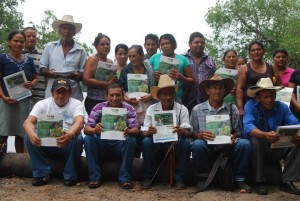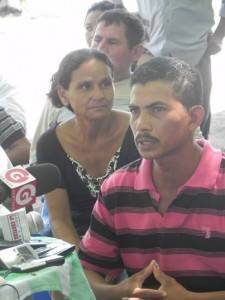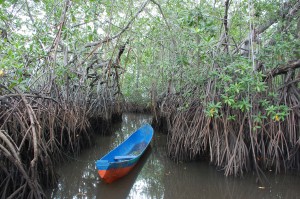 When I visited the Bajo Lempa region of eastern El Salvador this year, my new acquaintances taught me a joke.
When I visited the Bajo Lempa region of eastern El Salvador this year, my new acquaintances taught me a joke.
“Why aren’t there coupes de états in the United States?” they asked me. “I don’t know, why?” “Because there isn’t a U.S. Embassy.”
We laughed over it together, and I was reminded that in El Salvador, memories of U.S. intervention leading up to and during the Civil War are still fresh. Today interventionism rears its head in new forms, and in turn, resistance is also changing.
In May of this year, the U.S. Embassy in El Salvador pressured the Salvadoran government to change its procurement process to distribute seeds to family farmers. The government was buying almost exclusively from Salvadoran seed cooperatives. The Embassy complained that favoring local seed, leaving out transnationals, was not “fair or transparent.” Multinational agrobusinesses like Monsanto previously dominated the industry, and the U.S. found the new conditions disagreeable enough to withhold the $277 Millennium Challenge aid package to El Salvador.
The irony of the moment hit home both in the United States and El Salvador, as an unprecedented number of child and adolescent migrants fleeing Central America were arriving at the U.S. border. The Millennium funds, slated to encourage development in El Salvador, hardly seemed like the appropriate way to push the seeds issue.
Salvadoran farmer organizations, unions, and environmental groups and groups in the U.S. protested placing a “Monsanto clause” in the basic needs aids package. On July 3, the U.S. Embassy in El Salvador confirmed the dispute had been “resolved” and they would not withhold the $277 Millennium Challenge Corporation (MCC) funds.
Yet the U.S. has conditioned the Millennium funds on further reforms to Salvadoran law and the Salvadoran government is growing weary of the back-and-forth. Meanwhile, not all social movements in El Salvador even want the U.S. MCC funds, concerned that the development money is a Trojan Horse to bring in transnationals for tourism development in coastal El Salvador.
As one community organizer from this region describes, “We don’t know if these megaprojects are going to evict communities or give them some sort of direct benefit.” As one solidarity organizer who advocated for the seeds program put it, the MCC might be a, “new weapon to impose a neoliberal economic agenda.”
When the Rebels Enter Office: Development Aid and the FMLN
Created in the Bush administration to meet the Millennium Challenge goals, the first round of MCC funding provided $461 for El Salvador’s northern region bordering Honduras, including the construction of the Northern Transnational Highway. The U.S. set several conditions for the disbursal of the second round of MCC funding, a $277 package. MCC proposals are made in partnership with corporations, and while allocations will not be announced until the fund are approved, various proposals focus on tourism development in the Jiquilisco Bay region.
On June 1, El Salvador inaugurated Salvador Sánchez Cerén, the second president representing the Farabundo Martí National Liberation Front (FMLN) and the first who fought as an FMLN militant in the Civil War. Sánchez Cerén committed to reaching an agreement for the release of the MCC funds within the first one hundred days of his presidency.
El Salvador encapsulates the complex choices facing progressive Latin American governments today, as the former guerrilla President pushes to accept aid from the U.S., the country that funded the right wing throughout the 1980s Civil War. With one in five Salvadorans living in the U.S., and remittances exceeding $3.6 billion in 2010, the FMLN administration has combined promoting development at home and relying on U.S. aid and Salvadorans abroad.
This is in stark contrast to the almost two decades of ARENA rule after the Civil War, when the left and the FMLN, deeply intertwined if not indistinguishable, resisted the U.S.-imposed neoliberal economic agenda, such as a 2003 IMF plan to privatize the water system. The Central American Free Trade Agreement (CAFTA) faced fierce opposition in El Salvador, before it was ratified in December 2004.
When the FMLN, an ally of socialist governments in Nicaragua, Cuba and Venezuela, entered power in 2009 the U.S. government did not choose to isolate El Salvador economically. Instead, the U.S. continued to push its free trade economic agenda and the FMLN has sought to benefit from the economic aid at their disposal. Party members and social movements are increasingly divided whether this represents a necessary concession, or co-optation of the party’s values.
Family Agriculture vs. CAFTA
In 2011, the first FMLN administration began buying 88,000 quintales of corn seeds annually from eighteen Salvadoran cooperatives to distribute to 400,000 campesinos as part of the Family Agriculture Plan. Before 2011, Semillas Crisitani Burkard, a subsidiary of the biotechnology behemoth Monsanto, dominated 70% of the market, in the program created by ARENA President Tony Saca.
The seed purchase in December 2012 was decided by executive order, leaving out U.S. seed companies. Afterward U.S. Ambassador Mari Carmen Aponte called for a transparent procurement process including transnationals. But again this spring the buying took place without open bidding, according to the Secretary of Agriculture because they didn’t have enough time, buying all but a small portion of the seeds from national producers. The national producers have several advantages, including that the quintal costs about $123, compared to $155 for seeds produced by transnationals. And the main advantage is that the government supports its own producers.
The success of FMLN agricultural programs to support family farmers is already reflected in various development indicators. The prices of basic grains have stabilized and the domestic agricultural market was able to satisfy the national demand for beans and sorghum.
Ambassador Aponte and the U.S. Trade Representative continued to take issue with the procurement program, arguing it violated Section 9.2 of CAFTA because while including foreign companies, it was not a “competitive, objective, and transparent” playing field, according to the Embassy website. The seeds dispute heated up.
Farmers, Unions and Environmentalists Organize in Favor of Native Seeds
Both in El Salvador and in the U.S., people rallied to defend the seeds program. On June 6 in the capital of San Salvador, small farmer, union and community groups including the Protestant church, the Round Table on Food Sovereignty, the New Country Movement and Activist El Salvador marched to the Embassy denouncing U.S. pressure to open up competition between transnational corporations and local seed producers. U.S.-based solidarity organizations including the Committee in Solidarity with the People of El Salvador (CISPES) and the Share Foundation presented a petition with over 1,000 signatures calling for El Salvador’s right to promote domestic agricultural and development policies.
 In the U.S., CISPES and the Food and Water Watch circulated a letter defending the seeds program among progressive groups that garnered fifty signatures, addressed to Secretary of State John Kerry. On Capitol Hill, a second letter signed by sixteen congressional representatives was sent to Kerry.
In the U.S., CISPES and the Food and Water Watch circulated a letter defending the seeds program among progressive groups that garnered fifty signatures, addressed to Secretary of State John Kerry. On Capitol Hill, a second letter signed by sixteen congressional representatives was sent to Kerry.
Progressive groups focused on the role of the biotech industry and companies such as Monsanto and online petitions circulated among anti-GMO activists. Food and Water Watch’s international policy director said, “I suspect this is development policy by Monsanto.”
The mounting pressure led to a series of letters between the U.S. Trade Representative and the Technical Secretary to President Sánchez-Cerén. Eventually the Trade Representative was satisfied with the commitments of El Salvador and announced the dispute had been “resolved.”
CISPES Executive Director Alexis Stoumbelis said in an interview that the government remained, “committed to buying from local producers… …but we won’t see until February or March of next year how the new procurement process works.” Others are less optimistic as the government has not made firm commitments one way or the other. The results of the organizing, while having an initial impactful, remain to be seen.
MCC Pushes Privatization and “The Cancun of Central America”
This was not the first condition that the U.S. had placed on El Salvador to receive the MCC funds. In 2012 FMLN President Mauricio Funes, with the support of the U.S. Treasury, introduced the Public Private Partnership (PPP) bill. The bill proposed an executive committee to approve private companies to management public contracts in sectors such as transportation, municipal services, health and education. Ambassador Aponte threatened to withhold the MCC funds if the PPP was not passed and required $50 million of the funds to be reserved for PPP projects.
Salvadoran unions and other left movements organized against the bill as a repetition of devastating 1990s privatization policies. Union leader Jamie Lopez in an interview referred to the bill as “an extension of the lie believed by Latin American countries that neoliberal policies would get us out of our crises.” The FMLN negotiated some concessions, exempting water, education and health care from the bill, and the PPP ultimately passed in May 2013, exposing latent tensions between President Funes and the militancy of the FMLN.
Observing these trends, the Director of the Consumer Defense Council in El Salvador has also called for a reconsideration of the MCC funds due to the seemingly endless conditions the U.S. has created. The Law on Money Laundering, already reformed twice to meet U.S. demands, might be the straw that breaks the camel’s back. On July 21 the Technical Secretary, appearing exasperated in photos, declared they would not heed further Embassy complaints, “We can’t submit ourselves to letting them determine how we legislate, which is a sovereign act of the country.”
The concessions required under the MCC are not the only cause of concern. Communities in the Jiquilisco Bay region of the Usulután department have spoken out against the impacts of the MCC. José Roberto Acosta, field director of the organization Voices on the Border said in an interview, “We are very apprehensive that the funds are going to be principally targeted for tourism development megaprojects.”Developers want to brand the region, commonly known as the Bajo Lempa, with their own moniker: “The Cancun of Central America.” The region’s fragile mangrove forests would be at risk, along with the local communities’ agricultural lands and endangered sea turtles that live in the region.
In February of this year, I visited the Bajo Lempa. After the Peace Accords were signed in 1992, de-mobilized FMLN combatants, and refugees unable to return to their homes due to the prolonged violence were relocated to the region, where some campesinos had lived for generations.
After the Peace Accords the right-wing ARENA party, composed of members of the Civil War-era death squads, maintained power. Acosta explained, “During twenty years we never had benefits from the government here, they didn’t have the slightest interest… …What we have has been the product of international solidarity and the community organizing to provide for their own needs.”
Today, even after the FMLN’s ascent to the Presidency, the struggles of these communities continue. I visited the community of Amador Lopez, which occupies a narrow strip of land, hemmed in on one side by sugar cane plantations and the Lempa River on the other. The forces of agro-industry and environmental change, manifested in sea level rise and flooding, are palpable.
I stayed with a couple from the Morazán department who fought together in the Civil War, and came here in 1992. They live with their two children and one grandchild in a simple three-room home. The mother prepared vegetable soup and corn tortillas when I arrived. Vegetables and corn come from local fields. In the evening the parents told me stories of the war; a photo of El Che hangs on the wall, alongside a portrait of the couple during the war in their dark green fatigues of the guerrillas.
The Bajo Lempa has been a beneficiary of the government’s seed program both on the consuming and the producing side, as it is home to five of the eighteen cooperatives providing seeds. Acosta poined out, “In the last five years, there has been more help for the poorest people of the country through social programs.” However, the proposed tourism development would be disastrous for communities that practice campesino agriculture here due to demands on the water supply, highway construction and land concessions.
In a June 21 press conference, Bajo Lempa residents argued that the “ecotourism” model would threaten those who have “lived here for many years. They show that you can live in a way that does not affect natural resources.”Acosta explains that they aren’t opposed to all forms of tourism, but that it will only have local benefits if, “The communities control the process and are able to keep the returns. But that’s not what we’re seeing here.”
 Land speculation is already occurring in communities down the road from Amador Lopez, like “El Chile” that suddenly have some of the “most valuable real estate in El Salvador.” El Chile has never received land titles for their territory despite decades of efforts and powerful businessmen are already investing in the area, putting this community at risk for displacement. Acosta noted that in the year since the passage of the Public Private Partnership law they have already noticed more “aggressive” moves from tourism developers.
Land speculation is already occurring in communities down the road from Amador Lopez, like “El Chile” that suddenly have some of the “most valuable real estate in El Salvador.” El Chile has never received land titles for their territory despite decades of efforts and powerful businessmen are already investing in the area, putting this community at risk for displacement. Acosta noted that in the year since the passage of the Public Private Partnership law they have already noticed more “aggressive” moves from tourism developers.
Voices on the Border works with several other organizations in the region including the Intercommunal Association of Communities United for Economic and Social Development of the Bajo Lempa (ACUDESBAL) and CESTA Friends of the Earth El Salvador to organize against the megaprojects.
Communities in the Bajo Lempa are coming to the conclusion that the source of the problem are not the seeds, nor the demands of the Embassy, but the rigid regime of CAFTA, which remains the letter of the law even with the left party in power. In the words of Acosta, the FMLN “is continuing on the same path toward neoliberal politics.”
“Ultimately development isn’t a question of money.”
In the face of strings-attached development money, El Salvador’s social movements are proving that other worlds are possible. While historically politicians have been eager to accept the money and swallow the conditions that come with it, popular organizations have resisted the MCC conditions and defended the seed program. Taking their critique further, many in the Bajo Lempa reject entirely the U.S. development model that favors transnationals and instead seek a new sort of development.
Local resistance has an impact in the face of international trade policy and CISPES’s Stoumbelis observes that, “the ball game is changing for the U.S. to push these policies.” Yet as international trade agreements like the The Transpacific Partnership (TPP), which currently does not include El Salvador, threaten to supersede state and national legislation on the environment and labor, resistance can’t become mired in the details of specific conditions or clauses. While the seeds dispute was an effective rallying point, social movements must confront the elephant in the room– CAFTA. Whether or not the seed program continues in its current incarnation, as long as CAFTA is in force it is an active enabler of the U.S. free trade agenda.
Acosta is optimistic that the Bajo Lempa can provide its own development solutions. “People’s creative capacity has to be sparked, their organizational capacity. From there they will go on to build the alternatives that will improve their quality of life.”
True development in El Salvador will mean looking beyond U.S. money and the strings that always come with it. The country’s existing partnership with ALBA and the new BRICs bank indicate possible alternatives. Yet as Acosta says, “Ultimately development isn’t a question of money. Yes, you need funds and materials, but that isn’t the foundation.”
Building on the foundation of strong community organizations and social movements, effective development comes from “an endogenous process based on the conditions of the population.” It will be these processes that push the FMLN to make good on their commitments to the nation’s most marginalized, who struggle on a daily basis for a development outside the Millennium box.
Martha Pskowski is a writer and researcher based in Mexico City, originally from the Washington, DC area. Martha holds a B.A. from Hampshire College and works in the fields of anthropology and geography. Her research focuses on global environmental politics and their impacts on the indigenous communities of Mexico and Central American migrants in Mexico. She is a member of the CIP Americas Program team at www.americas.org.
Photos: Voices on the Border



